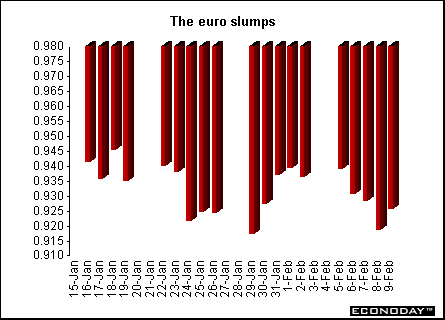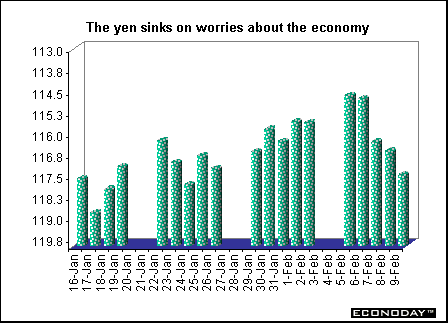
Currencies
The euro refused to be lifted by weak U.S. economic data, continuing to be slammed when the slightest sign of weakness in European numbers appeared. The euro sank against the dollar after earnings from some of the region's biggest companies indicated the economy is slowing. The earnings news reinforced expectations that Europe is experiencing difficulty. Clearly, a run of bad corporate numbers could have the effect of discouraging investment in Europe - and the euro.

The euro had its biggest drop in five weeks against the dollar. At the same time bad earnings were coming out, a German report showed that inflation accelerated last month -- suggesting the European Central Bank isn't going to stimulate growth with lower interest rates anytime soon. The 12 nation currency is being hurt by Europe's difficulty promoting growth, given that the inflation impact from higher oil prices was more severe there than in the United States.
The interest rate differential between the EMU and the United States has narrowed and should benefit the euro. The U.S. benchmark rate of 5.5 percent, which is expected to drop further in coming months, compares with 4.75 in the EMU. The gap has closed by 100 basis points in the past month, making EMU deposits relatively more attractive. Meantime, the outlook for the U.S. economy may not be so grim, which may have boosted the dollar, as Chicago Federal Reserve Bank President Michael Moskow has been talking up the economy.
The yen weakened again after the Nikkei average tumbled to near its lowest level in more than 15 years, sapping demand to buy shares. The yen and earnings repatriation will be the story over the next six weeks until end of fiscal year. However, yen declines will likely be restrained on expectations that Japanese companies will sell foreign currencies to boost their balance sheets before the end of March.

The yen's 12 percent slump since April 1 means companies that have overseas revenue are likely to show gains when converting overseas proceeds into their home currency. The currency rose in six of the past eight Februarys, which some analysts attribute to repatriation. With the end of the Japanese fiscal year fast approaching (March 31), exporters look for favorable rates to repatriate earnings. Exporters take advantage of a weak yen to do this.
For the past three years, Japanese were net sellers of foreign securities in the last two months of their business year. They sold 1.3 trillion yen ($12 billion) more foreign stocks and bonds than they bought in February and March of 1998, 1.4 trillion yen for the same months in 1999, and 26 billion yen in 2000.


Introduction • Global Stock Market Indexes • Recap of Global Markets • Currencies • Indicator Scoreboard

The Bottom Line • Looking Ahead
|